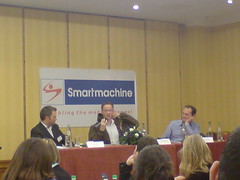MobileYouth: Music and Fun
GB: Music is social currency, used by youth for communication.
Dan Whiley, VP Commercial - Digital Media, MTV
Charlie Henderson, Director of Business Development, Motorola
Nigel Sheldon, Director of Digital, Starcom UK
GB (to the audience): What's the social value of music to young people?
Answers from delegates: clothing, listening to pirate radio, defining meeting places, karaoke, taking drugs, photos from TV, being in a band, DJing, tattoos, festivals, roller discos, choir, gigs, posters, kissing the TV, merchandise, political statements, many more.
GB: The Ghettoblaster was the predecessor of the iPod in that it was a status symbol. MP3 took some of the overt displaying of music (through physical items) away. How are companies using this to engage with young people?
DW: It all boils down to community.
GB: TOTP used to be the main event of the week, stimulating discussion the next day. Now it's been edged out - why?
DW: They didn't do anything wrong, they just got old. MTV invented music TV but has stayed fresh. MTV has many sub-brands now: 9 or 10 in the UK.
GB: But the mobile industry uses generic brands.
CH: I listened to music I didn't like, because I wanted to be part of a community. Kids are playing music out of their phone speakers in order to identify themselves and make a statement: this is the most important thing for them and music right now. Big headphones are cool right now: again, a display behaviour. Things aren't cool when everyone has the same thing: there'll be a backlash against the iPod.
GB: Youth are buying products that fulfil social needs, not those the industry is wanting them to meet. The Motorola V3 is a basic phone: 50-60m+ sold (equalling all makes of iPod). (To me, this indicates the power of good industrial design and marketing).
CH: Some people bought a silver RAZR, then upgraded to black, then pink, then went back to silver because it's now retro! The mobile industry doesn't have strong enough brands to appeal to youth alone. Therefore in the accessory business, we have to partner with appropriate other organisations. Motorola has no credibility in snowboarding, so we partner with Burton. (Demonstrates a musical jacket).
GB: The record labels have experienced MP3, for better or worse. How do they see mobile?
NS: Personalisation, the desire for simplicity, etc. are important. Overall experiences are important, beyond buying CDs: living Glastonbury, say. Mobile delivers a number of new behaviours: people being more in control, with more intricate behaviours. My teenage son moves from texting, to online, to IM, etc. They multitask better. Ad ad agencies and media agencies, we have to look at how we reach consumers in this context.
GB: UGC and social media are buzzwords, but how do we make them work around mobile and music - with technical, legal, etc. limitations and bearing in mind the important role that (worried) record labels have?
NS: It's quite intangible for most people. There are some interesting services out there (but he doesn't give any specific examples, grr).
Video of youth interviews: some have ipods, some have phones. Some like convergence, some don't.
DW: People don't want to pay for music on the phone, because they don't want to pay for music full stop. Kids don't differentiate between devices or channels as much as we do, such distinctions are artificial. Youth don't work with technology, they just take it for granted. They don't know what "community services" or "web 2.0" are, but use them nonetheless. Mobile music is just music.
CH: As a large technology company, we often invent without considering relevance.
NS: 8-10 year olds are different to later generations. Adults presume kids are distracted, but they have a different mindset. Observe them to understand them. Test and experiment.
Question from audience: operators don't get the fact that to appeal to market niches, they are not appropriate brands. Vodafone are not cool.
DW: Everyone is concerned about technology, we're more bothered about the screen. We don't care whether it's 3G or DVB-H.
Question from audience: isn't the key now to encourage downloads, through content discovery, personalisation, recommendation?
DW: Why do you want them to download music? That's taking a traditional model and trying to replicate it in a medium that may not suit it. Why not stop looking for the killer app, and recognise there may be 4 or 5 new opportunities. The internet may not be the sole answer. Steve Jobs did a good job of creating the digital download market by selling the record labels something they understand: "it's like a CD without the plastic". So, the next step: how do people interact with music as a whole?
